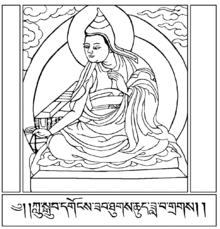- Dharmakirti
-
Dharmakirti (skt. Dharmakirti; tib. Chos-kyi grags-pa) war ein buddhistischer Philosoph und Logiker, der im 7. Jahrhundert in Indien lebte.
Das von ihm in sieben Traktaten verfasste System der Logik umfasst vier Abschnitte:
- die Wahrnehmung
- die Schlussfolgerung für sich
- die Schlussfolgerung für andere
- die logischen Fehler
Bedeutsam sind seine Untersuchungen zu Schlüssen mit negierenden Prämissen. Er entwickelte eine Begriffstheorie, die alle Begriffe durch Negationen (apoha) bestimmt.
Literatur (Auswahl)
- Vittorio A. van Bijlert: Epistemology and spiritual authority. The development of epistemology and logic in the old Nyaya and the Buddhist school of epistemology with an annotated translation of Dharmakirti's Pramanavarttika II (Pramanasiddhi) vv. 1-7. Wien 1989.
- Georges B. Dreyfus: Recognizing Reality. New York 1997.
- John D. Dunne: Foundations of Dharmakīrti´s Philosophy. Boston 2004.
- Pradeep P. Gokhale (Hrsg.): Vādanyāya of Dharmakīrti. Delhi 1993.
- Satkari Mookerjee: The Buddhist Philosophy of Universal Flux. Calcutta 1935.
- Theodore Stcherbatsky: Erkenntnistheorie und Logik nach der Lehre der späteren Buddhisten. München-Neubiberg 1924.
- Theodore Stcherbatsky: Buddhist Logik. New Delhi 1984 (2 Bde.) * Tilmann E. Vetter: Erkenntnisprobleme bei Dharmakirti. VÖAW, Wien 1964.
- Tilmann E. Vetter: Dharmakirti's Pramanaviniscayah 1. Kapitel „Pratyaksam“. Verlag VÖAW, Wien 1966.
- Tilmann E. Vetter: Der Buddha und Seine Lehre in Dharmakirti's Pramanavarttika. (Wiener Studien zur Tibetologie und Buddhismuskunde; Heft 12). Wien 1984.
- Tilmann E. Vetter: Der Buddha und seine Lehre in Dharmakirtis Pramanavarttika. Der Abschnitt über den Buddha und die vieren Wahrheiten im Pramanasiddhi-Kapitel 2. verbesserte Auflage. Wien 1990.
- Alex Wayman: A Millennium of Buddhist Logic. Delhi 1999.
Weblinks
- Literatur von und über Dharmakirti im Katalog der Deutschen Nationalbibliothek
- Tom Tillemans: Dharmakīrti, in: Stanford Encyclopedia of Philosophy (englisch, inklusive Literaturangaben)
Wikimedia Foundation.

